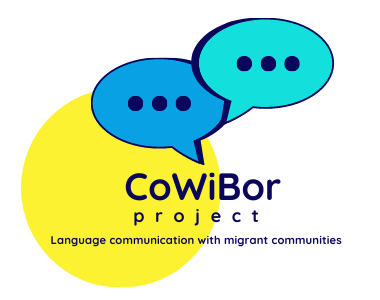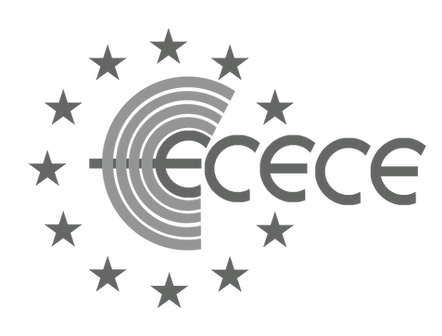Communication with migrant community

Project Number: 2022-2-IT02-KA210-ADU-000097444
Timespan of the Project: 1/02/2023 – 1/07/2024
Financial program: Erasmus+ (European Project KA210-ADU)
Financial program: Erasmus+ (European Project KA210-ADU)

Partnership: European Centre of Entrepreneurship Competence and Excellence (E.C.E.C.E.)
Objectives
Problem: bodies and associations that work with the settled migrant community (hospitals, health structures, local authorities, social cooperation bodies, employment centres, etc.) and with transiting ones (e.g. bodies and associations that support the migrant population at reception centres) tackle language communication problems in an improvised and limited manner.
This gives rise to serious consequences:
1) inadequate efficiency of the services;
2) stress and inefficiencies borne by the operators;
3) transmission of incorrect, incomplete and out-of-date information;
4) lack of dialogue, confidence and exchange between operators and the migrant population;
5) risk that the services offered will be replaced by ones from informal structures with the possibility of entrapment "trafficking" networks.
The aim of the project is to:
A_introduce the stakeholders to a communication dimension (interlinguistic and otherwise) that is structured and oriented towards the needs linked to the horizontal priorities and to the sectoral priority of improving educators' skills.
B_facilitate the most appropriate forms of communication for resolving the problems of communication with the migrant community in connection with the horizontal priorities of inclusion and active participation.
C_urging stakeholders to activate an effective communicative dynamic horizontal inclusion and active participation priorities sector priority to improve educator skills
This gives rise to serious consequences:
1) inadequate efficiency of the services;
2) stress and inefficiencies borne by the operators;
3) transmission of incorrect, incomplete and out-of-date information;
4) lack of dialogue, confidence and exchange between operators and the migrant population;
5) risk that the services offered will be replaced by ones from informal structures with the possibility of entrapment "trafficking" networks.
The aim of the project is to:
A_introduce the stakeholders to a communication dimension (interlinguistic and otherwise) that is structured and oriented towards the needs linked to the horizontal priorities and to the sectoral priority of improving educators' skills.
B_facilitate the most appropriate forms of communication for resolving the problems of communication with the migrant community in connection with the horizontal priorities of inclusion and active participation.
C_urging stakeholders to activate an effective communicative dynamic horizontal inclusion and active participation priorities sector priority to improve educator skills
Activities
1. Transnational Project Meeting. First meeting: sharing the work method
2. Translation of the questionnaires and of the documentation for distribution, including social media posts and websites
3. Identification of a needs analysis method and of the interlinguistic communication tools
4. Analysis of the results of the comparison activities and of discovering the language needs
5. Transnational Project Meetings. Second meeting: comparison between the needs identified in the various countries
6. Reporting and dissemination of the project outcomes
7. Transnational Project Meetings. 3rd meeting: Assessment of the results obtained
8. Monitoring and assessment activities
2. Translation of the questionnaires and of the documentation for distribution, including social media posts and websites
3. Identification of a needs analysis method and of the interlinguistic communication tools
4. Analysis of the results of the comparison activities and of discovering the language needs
5. Transnational Project Meetings. Second meeting: comparison between the needs identified in the various countries
6. Reporting and dissemination of the project outcomes
7. Transnational Project Meetings. 3rd meeting: Assessment of the results obtained
8. Monitoring and assessment activities
Results
The results of the project have an objective value that we will use in the contact with all the organisations with which we operate, for promoting more advance forms of interlinguistic communication. The procedures with which we will move will be the following:
a_we will transmit the project results to the recognised organisations and propose their adoption
b_we will propose the project results in the “hubs of interest” (web portals, associations, etc.) combined with webinar events in order to increase sensitivity towards the problems tackled by the project
c_we will take action with all the institutions (municipalities, metropolitan cities, regions, hospital authorities, job centres, schools, etc. with proposals for the training of their operators and the adoption of tools that are capable of attenuating language barriers in line with the principles that inform the project; we will also propose joint planning aimed at extending the reach of the project.
d_in the activities currently in progress (in the suburban schools with high numbers of students from migrant backgrounds, in the emergency health structures that work with the migrant community, and in the international organisations involved in legal, bureaucratic and health support for migrants fleeing along the Balkan Route) the project results will directly benefit the operators and will allow us to make the training activity more effective.
The main target groups are unquestionably the public institutions and the organisations envisaged by the national regulations for supporting and receiving the migrant population. On the other hand, however, the associations engaged in providing support to transiting migrants, often in emergency situations. These are often high risk situations in which a proper attitude towards linguistic barriers can be of fundamental importance. The contact procedures in this case obviously follow more informal paths but here too we believe that economic support from European measures can constitute a suitable solution, in direct and consequent continuance of this project.
a_we will transmit the project results to the recognised organisations and propose their adoption
b_we will propose the project results in the “hubs of interest” (web portals, associations, etc.) combined with webinar events in order to increase sensitivity towards the problems tackled by the project
c_we will take action with all the institutions (municipalities, metropolitan cities, regions, hospital authorities, job centres, schools, etc. with proposals for the training of their operators and the adoption of tools that are capable of attenuating language barriers in line with the principles that inform the project; we will also propose joint planning aimed at extending the reach of the project.
d_in the activities currently in progress (in the suburban schools with high numbers of students from migrant backgrounds, in the emergency health structures that work with the migrant community, and in the international organisations involved in legal, bureaucratic and health support for migrants fleeing along the Balkan Route) the project results will directly benefit the operators and will allow us to make the training activity more effective.
The main target groups are unquestionably the public institutions and the organisations envisaged by the national regulations for supporting and receiving the migrant population. On the other hand, however, the associations engaged in providing support to transiting migrants, often in emergency situations. These are often high risk situations in which a proper attitude towards linguistic barriers can be of fundamental importance. The contact procedures in this case obviously follow more informal paths but here too we believe that economic support from European measures can constitute a suitable solution, in direct and consequent continuance of this project.